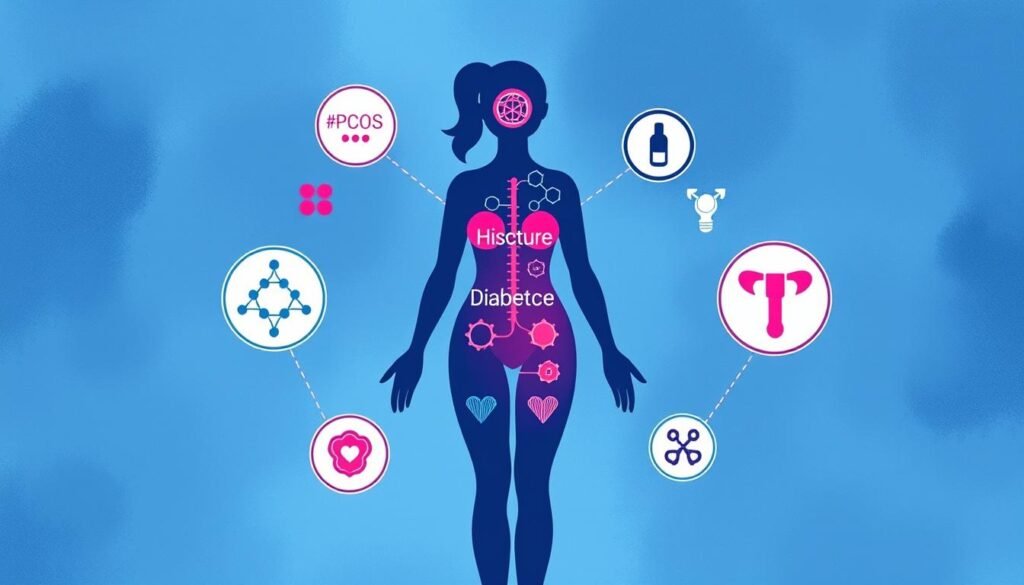Did you know more than half of those with Polycystic Ovary Syndrome (PCOS) may get type 2 diabetes by 40? This fact shows a strong link between PCOS and diabetes, impacting millions. About 5 million people in the U.S. live with PCOS. It’s crucial to know the risks this condition brings.
PCOS causes hormonal imbalance and increases the risk of insulin resistance. This raises the chance of type 2 diabetes and other chronic issues.
It’s very important to manage PCOS to avoid issues like diabetes, infertility, and heart diseases. Making smart lifestyle choices, such as eating well and staying active, can help a lot. This article offers great tips for dealing with PCOS and diabetes. It aims to guide you towards a healthier life.
Key Takeaways
- Over half of women with PCOS will develop type 2 diabetes by age 40.
- PCOS affects around 5 million people, intensifying the importance of awareness and management.
- Insulin resistance is common in PCOS and significantly increases the risk of type 2 diabetes.
- Lifestyle changes like diet and exercise can greatly reduce health risks for those with PCOS.
- Regular monitoring for diabetes symptoms is essential for women diagnosed with PCOS.
Understanding PCOS and Its Effects
Polycystic Ovary Syndrome, better known as PCOS, is a common issue among women who are able to have children. It features many cysts on the ovaries and high androgen levels. These lead to symptoms like infertility, irregular menstrual cycles, and weight gain.
Overview of Polycystic Ovary Syndrome
Around 5 to 10 percent of females in the U.S. are affected by PCOS. Symptoms often start with their first menstrual cycle. Those with PCOS have more androgens, causing a hormonal imbalance. This results in problems like obesity and infertility.
Many also have insulin resistance. This condition can increase androgen levels, making PCOS symptoms worse. A family history of PCOS can increase the risk of having it.
How PCOS Affects Women’s Health
PCOS significantly impacts health, leading to higher risks of type 2 diabetes and heart issues. Women with PCOS who are obese are more likely to have glucose problems by age 40. They also face more mental health challenges and risks of uterine cancer. Lifestyle changes, like managing weight, can help. For more information and treatment options, check this valuable resource.
Link Between PCOS and Diabetes
The link between PCOS and diabetes is a big health issue for many women. Insulin resistance is a key factor. It happens when the body can’t use insulin well, leading to high blood sugar. This problem is common in women with PCOS, raising their risk for other health problems.
Insulin Resistance in PCOS
Many women with PCOS have insulin resistance. This can lead to higher insulin levels. High insulin levels can cause weight gain and raise the chance of getting type 2 diabetes. Many studies show that up to 70% of women with PCOS face insulin resistance. This makes it crucial for them to manage their health closely.
Increased Risk of Type 2 Diabetes
Research shows that women with PCOS are much more likely to get type 2 diabetes. They are four to eight times more at risk than women without PCOS. Most women with PCOS are diagnosed with diabetes around the age of 31. This is younger than the typical age of 35 for those without PCOS.

Things like BMI, high insulin levels, and triglycerides link to diabetes risk in these women. Having more children might lower their risk. Research continues to explore how childbirth and oral contraceptives affect diabetes risk in women with PCOS.
| Factors | Impact on Type 2 Diabetes Risk |
|---|---|
| Insulin Resistance | Significantly increases risk |
| Obesity (High BMI) | Contributes to higher risk |
| Family History | Genetic predisposition to diabetes |
| Dietary Habits | Poor diet elevates risk |
| Number of Births | Higher number may reduce risk |
The relationship between insulin resistance, type 2 diabetes, and PCOS deserves attention. Knowing more about these links can help manage and improve the health of women affected.
Symptoms of PCOS
Polycystic Ovary Syndrome (PCOS) affects women’s bodies and feelings in many ways. Spotting symptoms early is key to manage it well. Signs like extra hair growth, acne, and missed periods are common. Since these symptoms vary from person to person, treatment needs to be personalized.
Common Physical Symptoms
Women with PCOS might face a mix of physical symptoms. They can range from mild to severe. Some include:
- Irregular periods: Many women find their menstrual cycles are not regular, affecting their fertility.
- Hirsutism: Having too much body hair on the face, chest, and back is a real problem for some.
- Acne: Hormone imbalances can cause acne, hitting one’s self-confidence.
- Putting on weight, especially around the stomach, making other symptoms worse.
These symptoms impact both body and mind. It’s crucial to understand how they’re connected to our overall health. For example, insulin resistance plays a big role in PCOS.
The Emotional Impact of PCOS
Dealing with PCOS symptoms can be emotionally hard. Many women feel less than, anxious, or depressed because of them. Issues like unwanted hair growth and acne affect how they see themselves.
Taking care of emotional health is crucial. It affects how one lives and follows treatment plans. Knowing the danger of not treating PCOS, like the risk of diabetes and high cholesterol, shows why early care is essential. Acting early can greatly improve quality of life.

Knowing about PCOS symptoms helps women take charge of their condition. It allows them to get the right support for their body and mind.
Diagnosing PCOS
Learning how to diagnose PCOS is key to managing it well and lowering its risks. To get it right, doctors look at symptoms, what meds you take, and your health history. They don’t just use one test to find out.
Importance of Early Detection
Finding PCOS early is crucial for controlling it and avoiding bigger problems. Many women have irregular periods or too much androgen, which might mean PCOS. Getting checked early if you have these signs is super smart for your health.
Here’s how doctors figure out if you have PCOS:
- They talk about your symptoms and medical history.
- They do physical check-ups, like pelvic exams and blood tests for hormones.
- They test your blood for cholesterol, triglycerides, and how you handle sugar.
- They use transvaginal ultrasounds to look at your ovaries and womb lining.
Being sure about PCOS early helps tackle it head-on, preventing serious issues like diabetes and heart disease. Women should keep tabs on their symptoms and period cycles. Also, note any meds you’re taking to talk over with your doctor.

PCOS and Diabetes: Risks Faced by Patients
Women with both PCOS and diabetes face serious health risks. These include heart disease and issues with having children. They must be aware and take action for their health.
Cardiovascular Complications
Heart disease is a big risk for these women. Several factors increase this risk:
- Elevated blood pressure levels
- Abnormal cholesterol concentrations
- More common obesity, leading to heart disease
Studies show women with PCOS are more likely to get type 2 diabetes. This makes heart problems more likely and shows why early action is critical.
Reproductive Health Issues
Reproductive health also suffers for these women. They face problems like:
- Increased chances of not being able to have children
- Greater risk of diabetes when pregnant
- Irregular periods, impacting fertility
Research shows women with Type 2 Diabetes have lower fertility. About 36% deal with reproductive issues, stressing the importance of careful management.
Effective Management Techniques
Managing PCOS and diabetes needs dedication to lifestyle changes for better health. These changes don’t just help with PCOS symptoms but also lower the risk of diabetes problems. Making healthy choices can positively affect overall wellbeing.
Lifestyle Changes for PCOS and Diabetes
Making lifestyle changes is vital for women with PCOS and diabetes. Key changes include:
- Increased Physical Activity: Regular workouts, like aerobic exercise and strength training, cut down insulin resistance and help with weight.
- Dietary Adjustments: Eating a balanced diet full of high-fiber foods helps control blood sugar.
- Weight Management: Losing just 5% of weight can greatly better hormonal balance and lessen symptoms.
- Stress Reduction: Using mindfulness and relaxation to manage stress prevents worsening hormonal imbalances from PCOS.
For tips on tracking weight, one can check out weight tracking and BMI management strategies. These are key for keeping an eye on progress.
Importance of Regular Medical Check-ups
Regular medical visits are key in managing PCOS and diabetes well. They let doctors:
- Keep an eye on insulin resistance and health overall.
- Check changes in weight and how the body is made up.
- Find problems early and take care of them right.
Staying on top of health through regular checks helps women manage better. It means they can avoid big problems with PCOS symptoms or diabetes. Paying attention to medical visits can lead to being healthier overall.
Treatments Available for PCOS and Diabetes
Finding the right treatment for PCOS and diabetes requires looking at both medicine and lifestyle changes. Everyone’s experience with these conditions is unique. That means treatment plans will differ depending on one’s symptoms and health goals.
Role of Medications, such as Metformin
Medications are key in treating PCOS and diabetes. Metformin stands out because it makes the body more sensitive to insulin and lowers blood sugar. Even losing just 5% of your body weight can make PCOS symptoms better. Besides controlling diabetes, Metformin also helps regularize menstrual cycles and combat issues like irregular periods and hormonal imbalances.
Hormonal Treatments for PCOS
Hormonal treatments like oral contraceptives are often used to ease PCOS symptoms. They work well against excessive hair growth and acne, both common with PCOS. For women looking to get pregnant, doctors might suggest Clomifene or letrozole. Sometimes, Metformin is added to help even more. Treatment plans are customized, and other options like laparoscopic ovarian drilling are considered if the first tries don’t work.
| Treatment Option | Purpose | Potential Benefits |
|---|---|---|
| Metformin | Manage insulin resistance | Regulates blood sugar, improves menstrual cycles |
| Oral Contraceptives | Manage hormonal symptoms | Reduces hirsutism, regulates periods |
| Clomifene | Stimulate ovulation | Enhances fertility |
| Letrozole | Stimulate ovulation | Alternative to clomifene |
| Laparoscopic Ovarian Drilling | Address fertility issues | Directly targets ovaries when medications fail |
Nutrition and Diet Adjustments
Nutrition is key in battling PCOS and insulin resistance. Eating right can make a big difference in your health. Choose whole foods to keep your blood sugar steady and fight insulin resistance, common in PCOS sufferers.
Balanced Diet for Managing Symptoms
A balanced diet is essential for managing symptoms. Eating a variety of nutrient-rich foods is beneficial. Here’s what to include:
- Omega-3 rich fish like salmon and sardines
- Olive oil, a healthy source of fat
- Beans, which are high in protein and fiber
- Non-starchy vegetables such as spinach and broccoli
- Whole grains like quinoa and brown rice
- Whole fruits such as berries and apples
Don’t forget about staying hydrated. Drinking plenty of water and choosing drinks with little or no sugar is crucial.
Foods to Avoid for Insulin Resistance
Some foods can make symptoms worse or increase health risks. Try to eat less of these:
- Foods high in simple carbohydrates
- Trans fats found in many processed foods
- Added sugars, typically present in sugary snacks and beverages
People with PCOS often have inflammation. It’s important to avoid foods that can make it worse. A diet change can help balance your hormones. Learn more about managing PCOS symptoms through lifestyle changes here.
| Food Type | Benefits | Foods to Avoid |
|---|---|---|
| Healthy Fats | Reduce inflammation, improve insulin sensitivity | Trans fats (found in fried foods, baked goods) |
| Whole Grains | Provide fiber, stabilize blood sugar | Sugary foods (sodas, candies) |
| Lean Proteins | Support muscle maintenance | Processed meats (hot dogs, deli meats) |
| Non-Starchy Vegetables | Rich in vitamins, low in calories | High-calorie snacks (chips, cookies) |
Conclusion
Knowing how PCOS and diabetes are linked is key for women’s health. Up to 20% of women in their childbearing years are affected by PCOS. This condition vastly increases their chances of having type 2 diabetes and heart problems.
Alarmingly, 70% of these women do not know they have it. This shows a big need for more awareness and early checks. Looking out for symptoms and knowing the risks is very important.
Making good lifestyle choices can greatly improve health. Things like seeing the doctor regularly and eating well matter a lot. These help with both PCOS and diabetes by fighting insulin resistance and boosting overall well-being.
Changing how you live can lead to big health boosts for women with PCOS and diabetes. Research backs this up, showing how vital these changes are.
Women can live better by focusing on their health early. Knowing about PCOS, spotting its signs, and taking action is crucial. Combining smart living, medical advice, and support will help tackle PCOS and diabetes challenges.
With these efforts, women can lower their health risks. This way, they can aim for a healthier future.